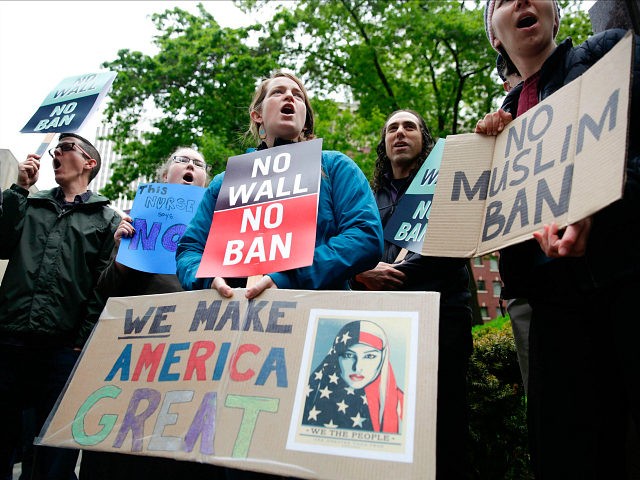Although the Supreme Court is poised to settle nationwide all legal questions regarding President Donald Trump’s Executive Order 13780 concerning immigration from terror-prone nations, the Ninth Circuit appeals court chose to block part of the federal government’s interim immigration plan before the justices have an opportunity to weigh in.
Among other things, Section 2(c) of the executive order (EO) established a 90-day restriction on immigration from six terror-prone nations. The window was to allow the U.S. Department of Homeland Security and other federal agencies to establish “extreme vetting” procedures to ensure that America was not importing foreigners who seek to do harm to the American people. Establishing such vetting procedures was one of President Trump’s major campaign promises.
President Trump signed the EO on March 6, replacing an earlier measure, Executive Order 13769. The administration was sued immediately over the new EO, just as the administration had been sued over the first one, which was signed on January 27, just days after the new president took office.
The two most left-leaning federal appeals courts in the nation — the U.S. Courts of Appeals for the Fourth Circuit and Ninth Circuit — invalidated EO 13780 on multiple grounds. The Supreme Court will review these decisions when it hears oral arguments in Trump v. IRAP on October 10.
On June 26, the Supreme Court granted a partial stay of the appeals courts’ rulings against the EO, allowing most of the EO to go into effect. Three justices — Clarence Thomas, Samuel Alito, and Neil Gorsuch — would have granted the requested stay in its entirety, allowing every provision of the EO to take full effect immediately.
The other six justices were willing to leave the lower courts’ blocking of the EO in place only for people with “close familial relationships” to people in the United States. The Trump administration promptly issued a policy defining what sort of relatives qualified for this exemption.
The plaintiffs in the Ninth Circuit case, Hawaii v. Trump, filed new briefs in Hawaii’s federal district court, arguing that the interim policy was not nearly broad enough. The left-leaning Hawaii judge on the case agreed, ordering that a number of additional categories of family members must be allowed to enter the United States immediately.
On September 7, a three-judge panel of the Ninth Circuit agreed, affirming the lower court’s injunction.
“The Government unreasonably interprets the Supreme Court’s reference to close familial relationships,” the court began.
“The Supreme Court granted the stay with respect to foreign nationals who lack any bona fide relationship with a person or entity in the United States,” the San Francisco-based appeals court continued.
That may be over-reading what the Supreme Court said. The justices held that “the Government’s interest in enforcing [the travel restriction], and the Executive’s authority to do so, are undoubtedly at their peak when there is no tie between the foreign national and the United States.” The Court said presidential power would be at its “peak” when there is “no tie,” not that the president lacks any power to restrict immigration when there is some tie.
The Ninth Circuit went on to hold that “grandparents, grandchildren, brothers-in-law, sisters-in-law, aunts, uncles, nieces, nephews, and cousins of persons in United States” have enough of a relationship with people currently in this country that the lower court’s expanded order forcing the government to allow those persons to enter the country is proper, specifying the additional types of relatives the court was exempting from the EO.
The case is Hawaii v. Trump, No. 17-16426 at the U.S. Court of Appeals for the Ninth Circuit. The primary case is Trump v. IRAP, No. 16-1436 and 16-1540 at the U.S. Supreme Court.
Ken Klukowski is senior legal editor for Breitbart News. Follow him on Twitter @kenklukowski.

COMMENTS
Please let us know if you're having issues with commenting.